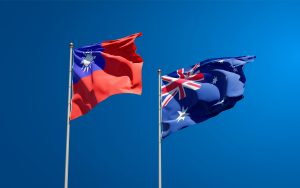Last week the Australian Broadcasting Corporation (ABC) ran a curious two-part article series titled “What would war with China look like for Australia?” (Part 1 and Part 2).
These articles were built on the assumption that Australia is “sleepwalking” into following the United States into a war with China over Taiwan, and sought the analysis of local experts about where Australia is positioning itself and what would be the country’s response to any hypothetical war.
The articles were an indication of the heightened anxiety over the prospect of a war breaking out in the Indo-Pacific.
What was concerning about these articles’ analysis was the instinct to frame any potential conflict as simply part of the great power competition between China and the United States, with a blatant disregard for the desires, agency, and well-being of the people of Taiwan. Through this perspective, Taiwan is deemed to be nothing more than an appendage of U.S. hegemony – rather than an island that contains people with their own legitimate right to choose their future or preserve their autonomy.
Added to this, the tone of these articles was filled with lazy snark that Australia is simply an insipid lapdog blindly doing Washington’s bidding, with no genuine reason to want the status quo to be protected. Questions posed to analysts like “If the U.S. decides to go to war with China, should Australia join?” frame any hypothetical war as one of U.S. aggression. There was no questioning of the legitimacy of the People’s Republic of China’s (PRC) claim to Taiwan (an island it has never controlled), or any acknowledgment that if it chooses to invade Beijing would be entirely responsible for the consequences.
The most astonishing assertion by one analyst was that “Australia has a fundamental strategic pathology – to support the interests of the U.S. at the expense of our own. A war with China over Taiwan, awful as that would be, involves no Australian national interests.”
Yet this is fundamentally false. Australia is an export-driven economy and the bulk of its trade travels by sea. Three of its four largest trading partners are in Northeast Asia. It is a vital Australian interest that Northeast Asia is stable and that its sea-lanes remain open and free from conflict. If this isn’t a direct and critical concern to Australia, I’m not sure what is.
Of course, war itself would be disastrous to this trade, but the capture of Taiwan by the PRC would also be highly destabilizing. With the Taiwanese people highly motivated to maintain their rights and freedoms it would create a permanent destabilization in Northeast Asia. This would make freedom of navigation in the region highly volatile and insecure. Beijing’s subsequent global isolation would also heavily affect the PRC as Australia’s largest export destination. Australia’s critical interests are the deterrence of any invasion and to maintain the status quo.
Despite the almost constant attempts to separate values and interests within international relations scholarship, values and interests are the same thing. It is Australia’s values that drive its interests. Without its current values, Australia’s interests would be different.
As Australia’s prosperity is tied to the open sea lanes between itself and Northeast Asia, it is important to recognize that freedom of navigation flows from the same philosophical well as freedom of assembly, freedom of speech, respect for human rights, and democracy itself. The common foundation is the trust in human beings to be able to exchange freely with each other, and the human flourishing that emerges from this.
It is also in Australia’s interests that people who are striving to protect these values – whether in Ukraine or Taiwan – are offered solidarity and support. Appeasing ethnic nationalist parties doesn’t have a great history. Taiwan’s indigenous population especially has much to fear from the PRC given the Chinese government’s actions in Tibet and Xinjiang. If Australia is serious about its “First Nations Foreign Policy” then this should be a major concern – as it would be through the Pacific Islands, which share close cultural connections with Taiwan’s indigenous population.
War is in no one’s interests, and – despite the presumptions of these articles – that includes the United States and China. We should never confuse the ability of powerful states to exert their might with the moral legitimacy to do so. As we are currently seeing with John Mearsheimer and Russia, there’s a tendency for “realists” to become cheerleaders for those states that prove their theories about power correct. However, if – as the overarching theme of “great power politics” suggests – aggression from powerful states is inevitable, then deterrence is legitimate.
It is disappointing that ABC would publish an article series about the fate of Taiwan that failed to include a single Taiwanese voice or perspective. It is also disappointing that the broadcaster – by far Australia’s most trusted and important – would resort to lazy interpretations of Australia’s strategic calculations, provide a megaphone to intellectually juvenile anti-Americanism, and an uncritical acceptance of the PRC’s claims to Taiwan.

































